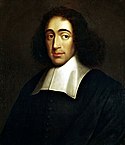Baruch Spinoza Quote
In proportion as we endeavor to live according to the guidance of reason, shall we strive as much as possible to depend less on hope, to liberate ourselves from fear, to rule fortune, and to direct our actions by the sure counsels of reason.
Baruch Spinoza
In proportion as we endeavor to live according to the guidance of reason, shall we strive as much as possible to depend less on hope, to liberate ourselves from fear, to rule fortune, and to direct our actions by the sure counsels of reason.
Tags:
reason
Related Quotes
For the most part, people strenuously resist any redefinition of morality, because it shakes them to the very core of their being to think that in pursuing virtue they may have been feeding vice, or i...
Stefan Molyneux
Tags:
anarchy, ancap, belief, brainwashing, coercion, critical thinking, dangerous, education, ethics, evidence
About Baruch Spinoza
Baruch (de) Spinoza (24 November 1632 – 21 February 1677), also known under his Latinized pen name Benedictus de Spinoza, was a Dutch philosopher of Portuguese-Jewish origin. As a forerunner of the Age of Enlightenment, Spinoza significantly influenced modern biblical criticism, 17th-century rationalism, and Dutch intellectual culture, establishing himself as one of the most important and radical philosophers of the early modern period. He was influenced by Stoicism, Maimonides, Niccolò Machiavelli, René Descartes, Thomas Hobbes, and a variety of heterodox Christian thinkers of his day. He is considered to be one of the leading philosophers of the Dutch Golden Age.
Spinoza was born in Amsterdam to a Marrano family that left Portugal for the more tolerant Dutch Republic. He had a traditional Jewish education, learning Hebrew and studying the sacred texts. He was part of the Portuguese Jewish community, where his father was a prominent merchant. As a young man, Spinoza was permanently expelled from the Jewish community for defying rabbinic authorities and disputing Jewish beliefs. After his expulsion in 1656, he did not affiliate with any religion, instead focusing on philosophical study and lens grinding. Spinoza established a dedicated following who met to discuss his writings and was devoted to pursuing truth philosophically.
Spinoza challenged the divine origin of the Hebrew Bible, the nature of God, and the earthly power wielded by religious authorities, Jewish and Christian alike. He was frequently called an atheist by contemporaries, although nowhere in his work does Spinoza argue against the existence of God. Along with Leibniz and Descartes, Spinoza is considered to be one of the main representatives of 17th century rationalism; a philosophical position that holds that reason is the chief source of knowledge. His theological studies were inseparable from his thinking on politics; he is grouped with Hobbes, John Locke, Gottfried Wilhelm Leibniz, and Immanuel Kant, who established the genre of political writing called secular theology.
Spinoza's philosophy encompasses nearly every area of philosophical discourse, including metaphysics, epistemology, political philosophy, ethics, philosophy of mind, and philosophy of science. With an enduring reputation as one of the most original and influential thinkers of the seventeenth century, Rebecca Goldstein dubbed him "the renegade Jew who gave us modernity."
Spinoza was born in Amsterdam to a Marrano family that left Portugal for the more tolerant Dutch Republic. He had a traditional Jewish education, learning Hebrew and studying the sacred texts. He was part of the Portuguese Jewish community, where his father was a prominent merchant. As a young man, Spinoza was permanently expelled from the Jewish community for defying rabbinic authorities and disputing Jewish beliefs. After his expulsion in 1656, he did not affiliate with any religion, instead focusing on philosophical study and lens grinding. Spinoza established a dedicated following who met to discuss his writings and was devoted to pursuing truth philosophically.
Spinoza challenged the divine origin of the Hebrew Bible, the nature of God, and the earthly power wielded by religious authorities, Jewish and Christian alike. He was frequently called an atheist by contemporaries, although nowhere in his work does Spinoza argue against the existence of God. Along with Leibniz and Descartes, Spinoza is considered to be one of the main representatives of 17th century rationalism; a philosophical position that holds that reason is the chief source of knowledge. His theological studies were inseparable from his thinking on politics; he is grouped with Hobbes, John Locke, Gottfried Wilhelm Leibniz, and Immanuel Kant, who established the genre of political writing called secular theology.
Spinoza's philosophy encompasses nearly every area of philosophical discourse, including metaphysics, epistemology, political philosophy, ethics, philosophy of mind, and philosophy of science. With an enduring reputation as one of the most original and influential thinkers of the seventeenth century, Rebecca Goldstein dubbed him "the renegade Jew who gave us modernity."
